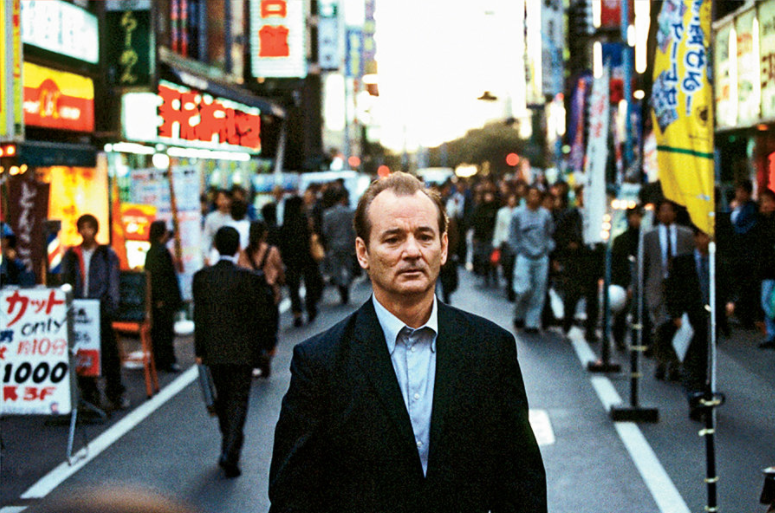
Last week, the Stanford Daily published a movie review that criticizes the 2003 film Lost in Translation for “reinforcing a racist worldview” and “contributing to systemic racism.”
Lost in Translation, directed by Sofia Coppola and starring Bill Murray and Scarlett Johannson, is a story about two Americans who visit Tokyo and bond over their shared culture shock and awkward experiences with the native Japanese population. The film garnered four Academy Award and five Golden Globe nominations, becoming one of the most critically acclaimed films of the early 2000s.
I’m Asian-American, and I’ve seen plenty of Hollywood movies. Lost in Translation is one of my favorites , and I was surprised to find it branded “racist” and “belittling of Asian culture”.
The author accuses the film and its director of several racist missteps, one of which is the film's depiction of native Japanese characters. According to the author, “Coppola clearly wants viewers to side with the ‘normal’ white protagonists'' and “think of the Japanese characters as strange.”
What’s strange is that the author presumes to know what Coppola hoped to achieve with the film. Getting inside a director’s head to brand them racist is truly comical, and the author does this multiple times through the article, going so far as to accuse Coppola of having a “racist narrative design.”
The author points out that in the film, native Japanese men “frequently shout, dance, and use unnatural vocal inflections” and “read explicit manga on subways and play loud arcade games.” She interprets this to mean that “Asians are the butt of the joke.”
It’s unclear what the joke actually is. How is the presence of explicit manga on subways racist? As for the loud arcade games, Japan, like many other East Asian nations, has a strong video game culture. Depicting this is not racism.
And when the author refers to the native Japanese and their “unnatural vocal inflections” and “switching of Rs and Ls”, I think she is referring to an accent, which almost every non-native English speaker has. My parents are immigrants and they speak English with an accent. I don’t think it’s “unnatural.” On the contrary, if a movie set in a foreign country didn’t feature natives speaking English with an accent, I’d consider that to be whitewashing.
The author then hones in on the racism of “the [American] characters’ frustration with English-speaking Japanese characters”, citing a few scenes in the movie where Bill Murray becomes confused and upset when he struggles to communicate with the native Japanese. The author connects this to “a larger trend of non-native English speakers taking on painstaking burdens to learn English, while Americans remain ignorant of or dismissive towards how the rest of the world caters to them.”
Newsflash: English is recognized as an official language in 67 countries -- and fun fact: the US isn’t one of them! For better or worse, it’s the global lingua franca. People in the rest of the world aren’t catering to Americans with their painstaking attempts to learn English - they’re simply following a global convention.
The author concludes her analysis with a series of bold claims about what the film actually represents, such as “the world is the white American’s oyster”, “white Americans are the only ones who think and feel interesting things”, and “Lost in Translation disguises its racist underpinnings by parading as a movie about loneliness and unlikely connections.”
That last claim is especially absurd. Once again, the author attempts to get inside the director’s head, this time to argue that the entire storyline of the movie is a farce and it is instead a racist trojan horse. In reality, Sofia Coppola made the movie because she had spent time in Tokyo, grew fond of the city, and wanted to capture her personal experiences. That sounds like quite the racist mastermind.
Even some native Japanese film critics dismissed the notion that Lost in Translation perpetuates a racist view of Japan. Yasuhisa Hirada addressed the accusations of racism surrounding the movie in his review, writing that “In the United States, some people were concerned that the film might appear as anti-Japanese. Despite that fact, the film neither tries to dissolute Tokyo nor investigates it; the peculiarity and wonder of the city is accurately reflected… Above all, there is wonderful humor and breath-taking acting from Bill Murray. We are not so narrow-minded to criticize such a great film.”
“Narrow-minded” is the right phrase to describe those who needlessly attach the label of racism to perfectly innocuous films. Hollywood does have a history of stereotyping Asian-Americans; films such as The Mask of Fu Manchu and Indiana Jones and the Temple of Doom exaggerated certain physical features of their Asian characters. But Lost in Translation is not such a film - it’s a film about individuals who encounter an unfamiliar environment abroad and respond with frustration and genuine confusion. Anyone who’s traveled internationally, white or not, has experienced that.
If we keep judging every piece of art through today’s unreasonably woke standards, we are going to miss out on the great deal of artistic and cinematic diversity that the past has given us. So, if you haven’t seen Lost in Translation, I’d highly recommend watching it. You can decide for yourself whether it’s “low-effort and discriminatory.” But my guess is you won’t.
No comments:
Post a Comment